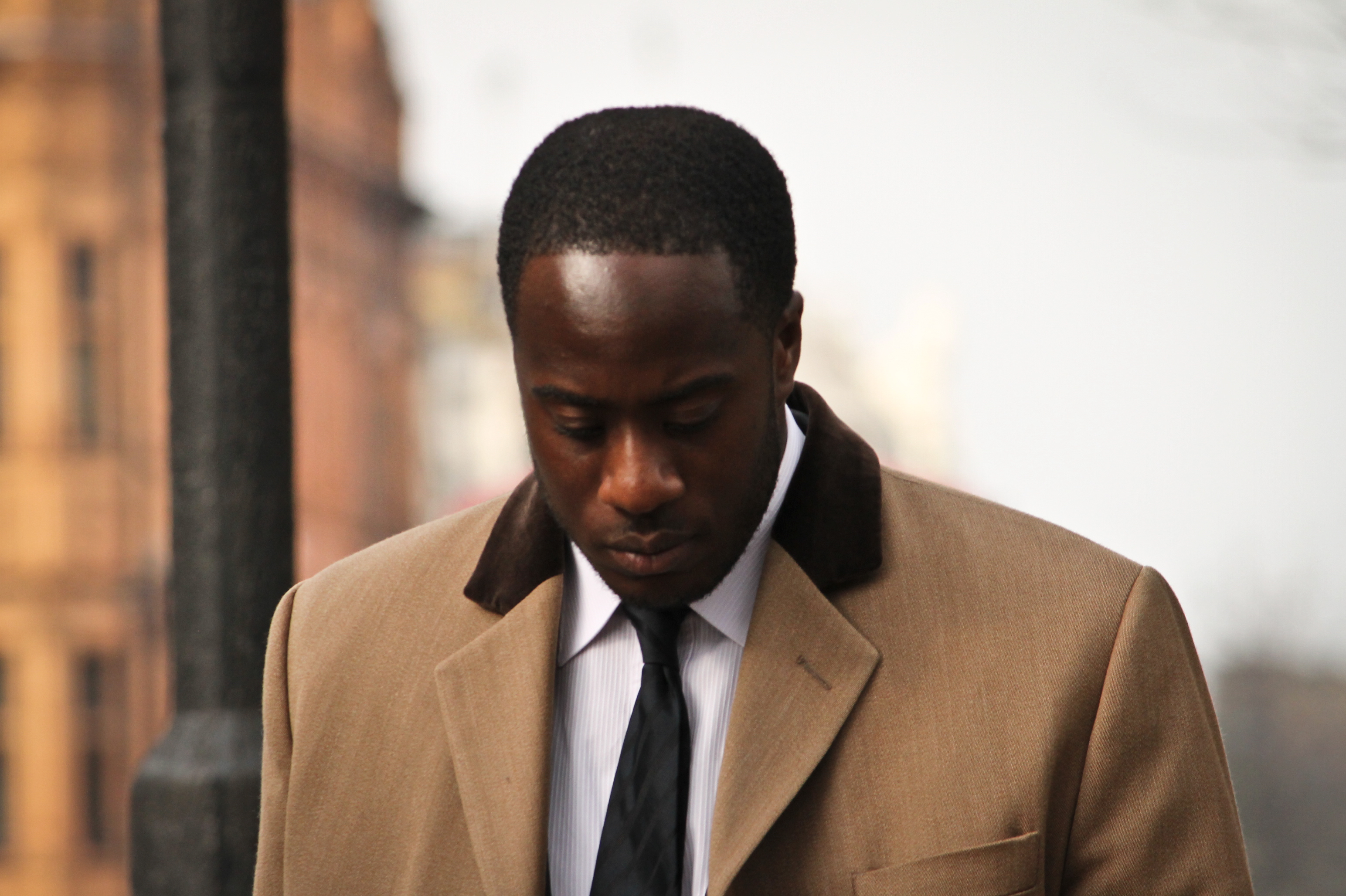(Taken in March 2012.)
On Mourdock’s God’s Gift
[Updated to include Mr. Mourdock’s clarification re: his remark.]
I’ve been thinking about Mourdock’s remark that rape is–to quote my writer-friend Stefanie Kalem–“just some kind of unfortunate wrapping paper that the gift of life comes in sometimes.” He shared his account of his personal struggle and his epiphany at the Indiana Senate debate on Tuesday:
“’I’ve struggled with it myself for a long time, but I came to realize that life is that gift from God,’ Mourdock said at the debate, explaining his position that women who are raped should not have the right to an abortion. ‘And even when life begins in that horrible situation of rape, that it is something that God intended to happen.'”
Once the rage cleared (and it took some time) I got interested. I work on the early modern period, so I’m never not steeped in the complex torsions Christian thinking requires (especially when it becomes necessary to denounce Lutheranism in favor of Zwinglianism and some aspects of Calvinism). And it seems to me that Mourdock deserves some credit for being—at first glance—internally consistent. I’m not alone. Many people have noted this, and say Mourdock’s position “makes sense,” and if you take issue with it, it’s because you disagree with his religion. The logic is right if you agree with his premises. This is nonsense, and it’s dangerous nonsense, because it gives people like Mr. Mourdock credit for being logical where they are in fact being extremely sloppy. The (theo)logic breaks down on its own terms when you do it the favor of giving it a second look:
- If you believe life begins at conception—that an egg and sperm are a human being—then you can allow no exceptions: not for rape, not for incest, not for the 9-year-old in Brazil who got pregnant with twins after her stepfather raped her, and was in danger of dying because her body couldn’t handle it. So far, logic and Mr. Mourdock are in agreement.
- He clarified thusly after the debate, horrified that his remarks had been taken to mean that God pre-ordained rape: “What I said is that God creates life.” But here’s the thing: if life is in God’s plan, being divinely created (and intended) in the 9-year-old’s body while her father rapes her, so is the 9-year-old’s death when her body gives out. Life and death are not separable concepts. Ask anyone who’s worked in a maternity ward. Ask anyone who’s worked in a church.
- If that’s your logic, you need to take your belief in God’s plan all the way. God’s plan is not purely creative, however sunnily Mr. Mourdock’s portrayal of it in #2. The context in which he mentions God’s creation is, inescapably, rape; suffering and adversity are important aspects of Christian faith. Even if your branch of Christianity holds that death is the result of the Fall, and entirely attributable to human sin, you also believe A) that death is a step toward everlasting life and B) that death, as experienced by humans, is part of God’s plan. If a loved one dies, the line is not that God was unjust or even that we are being punished, but rather these things are sent to try us. It is part of God’s plan.
- We’ve established that Mr. Mourdock is particularly interested in God’s plan as it applies to life, reproduction, and (as I’ve shown in #3) death, yet he seems singularly uninterested in legislating other violations of that divine plan. What of erectile dysfunction? Infertility? God doesn’t think you should have children. Treatment should be outlawed. Cancer? Disease? It’s in God’s plan–after all, death brings you that much closer to everlasting life. Abolish chemotherapy. For every medical intervention that deals with the foregoing subjects, the question must be asked: why, if you believe in a divine organizing principle that expresses itself in the biological functions of the body (and this is Mr. Mourdock’s argument) are you interfering?
- You can’t. If one takes this line to heart, it needs to be followed with rigor. I can respect that view (and do–I have friends whose beliefs tend this way). But God’s plans aren’t to be trifled with, and they’re not half-baked. You don’t get to cherry-pick such that rape victims bear the brunt of your theology.
- If you persist in this kind of selective thinking, you are not a hero of the Christian right standing up for divine truth in a sea of heresy. Quite the contrary. You are a nattering hypocrite who mistook a shallow exercise in juggling abstractions (conveniently stripped of their humanity) for integrity. Only where your “realization” touches your own life—your own life—does it bear truth or relevance, and there its transcendence ends. Do not attempt to speak of a divine plan, as you are a poor theorist. Instead, realize the monstrosity of your belief that your feeble, moth-witted “struggle” somehow authorizes you not only to legislate your personal theology—in a country founded on the separation of church and state—but also to force women (and women alone) to accept these “gifts” from your bleak and misguided idea of God. You are un-American, sir, and it is not God’s fault that you are a bad philosopher. Have the piety to let the blame for that lie squarely on your shoulders.
Pop Culture Love
I’ve been thinking about how shows aren’t just deep immersive experiences in their own right, they’re also fuel for the thick conversation of friendship. TV sociality: what’s behind it? Why? When I see a good show, I find I instantly want to re-watch it WITH someone. Watching alone is a thin, unrewarding experience. It’s nothing compared to the exquisite pleasure of re-watching it through someone else’s eyes. The double spectacle, it enthralls. You see them see it for the first time. And then you talk. You saw it that way? How? You walk your friend through the steps of why you saw it the way you did. Then she does the same for you, and so the two of you you walk back and forth through the show together as if it were a park, and you British and observant and commenting on the passersby. This is what really pleases, this small rehearsal of interpretations, this comparison of codes. Shows become a game and an occasion to reveal your interpretive apparatus to each other. Here is how I see the world! you say to your friend, and here is how I see art! And here is the exact distance I like between the real world and art! Here is what makes me laugh, and here is why! AND YOU? What do you think?
The flip side obtains too: never happier than when I get to watch someone watch something I’ve already seen, I’m briefly heartbroken when they don’t like it.
Ironically, I’m exactly the sort of person who doesn’t like things when they’re introduced in this particular way. It’s karma that I get my heart broken by people not loving the things I watch them watching, since I’ve spent a lifetime being an accidental Debbie Downer raining on people’s televisual loves.
It’s not annoyance, though I know plenty of people I’ve annoyed by talking up a movie too much, thereby jump-starting their assembly of reactionary hate-bricks. Annoyance with hype is probably a part of my resistance, but the bigger part is severe performance anxiety. For all that I love watching people watch shows I like, I’m horrible at being watched watching. I get anxious. I’m instantly defensive. I spend the entire time much too aware that I’m supposed to be reacting—what am I missing? Which reaction am I supposed to have and which one am I actually having and what, precisely, is the difference between the two? My brain shuts down. I don’t understand what’s going on. I sort of panic.
I’m not aware of any of this—the flurry is all just under the surface. But panicking, however unconscious it might be, is unpleasant, and I suspect the unpleasantness of feeling panicky has a lot to do with my thinking I don’t like the show when I do (or will). This happened when Danielle (Carla Fran) showed me Peep Show for the first time, and when Sandi showed me That Mitchell and Webb Look, and when Rachel showed me A Bit of Fry and Laurie. These people are all cooler than me, and so I watched, uncomprehending, suspicious of their cool, failing to trust the experience.
This is now way to live. All three of these people have incredible taste, and to say I warmed to all three shows is a massive understatement. I’ve since watched all these shows eighty times if I’ve watched them once, and that’s a conservative estimate. Yet this strain of reactionary ungraciousness remains. How do I make it stop?
That I’ve been lucky to have a few friends who put up with this insufferable quality in no way excuses the fact that I can’t seem to short-circuit it. Danielle introduced me to a myriad of wonders including the BBC Pride and Prejudice, BBC’s The Office, My So-Called Life, Green Wing, Peep Show, and Nighty-Night. Rachel introduced me to Gilmore Girls. Jane lent me Arrested Development. Kia introduced me to Once. Gina showed me Firefly, and she and Irene have been trying to get me to watch The Good Wife.
I have not yet watched The Good Wife. I am disinclined to watch The Good Wife. WHY, in light of all the aforementioned gifts I’ve had at the hands of all these great people, all things I came to love despite my original resistance, WON’T I WATCH The Good Wife?
There’s a reason, and it isn’t a good one.
It’s for the same reason I almost never read another book by an author whose book I particularly loved. It’s an anxiety about friendship. What if it fails to be fed by this latest show? What if it turns out the deep resonance between us was a one-off? What if what I see as high art you see as schmaltzy, cheesy, or otherwise bad? What if you think James Franco is brilliant? What if our friendship was founded on a misunderstanding? What if now we see things in different ways?
These things are never quite true, but terror lives in the possibility that they might be. Friendship love is like romantic love; the hypotheticals are where things really fall apart. Drop them instead. Dig in: DO YOU LIKE JAMES FRANCO? TELL ME ABOUT THIS LIKE! Does Daniel Desario remind you of Jordan Catalano? Or of your high-school boyfriend? Or was 127 Hours amazing? Where is his brilliance? His prose? His acting? His multiple graduate programs? What of his do you admire?
The real question is obvious: where do our perspectives reconnect? Whatever you do, and whatever I do, may we never let our likes and dislikes stand as final pronouncements. Dismissive judgment is condescension is scorn is death. “It’s just not my thing” is a refusal of friendship. Get back to first principles. If I dislike James Franco and you don’t, it’s not because I am high-brow while your brows rest mawkishly beneath your nose. I dislike him because he is greasy, and because I think he is a poor writer who wrote that shadows are shadow-like, and because I find teaching a class on yourself hubristic, and hubris troubles me since I suspect it too often gets mistaken for talent. (Particularly when men have it and perform a Rebel Without A Cause sort of masculinity that somehow makes this regrettable comportment acceptable.) His eyelids droop and make him look sleepy, and it’s rude to look above it all and sleepy all the time. (Yes: rude! Behold the schoolmarm within!) But there’s more: If a lack of effort is unpraiseworthy, and I think it is, then an effortful display of a lack of effort is contemptible. He made Anne Hathaway work harder at an awards show than any human being should ever have to emotionally work. It wasn’t just wasteful, it was mean. He did that because he thought it was the cool thing to do, and coolness drags people toward ethical emptiness. (I just said that as an absolute, but of course what I really mean is that I was never cool growing up, so cool is wrapped up with rejection, and all the self-righteous justifications rejection brings.)
I know next to nothing about James Franco, but I think he’s empty. Above are my reasons, and they aren’t so much profound as frankly (ha!) autobiographical. What matters more than my objective assessment of James Franco (I mean really, who cares?) is the subjectivity behind it. What’s yours? Can our subjectivities hang out?
None of that conversation can happen till I shake myself loose of my bad habits. I’m going to watch The Good Wife.
On Ruining Violentacrez’ Life
[This is part of a comment I wrote in response to Eric on my previous post on l’affaire Violentacrez. Reposting here because the concern over Chen “ruining lives” requires some curious erasures. UPDATED to include Michael Brutsch (Violentacrez) admitting that women have found their photographs under r/creepshots and asked for them to be taken down.]
One point many Violentacrez defenders emphasize is that his life will be ruined by Chen’s decision to expose him. By this they mean chiefly that he will likely be fired and become unemployable thanks to Google searches like the ones you describe. But it’s telling, isn’t it, that these are the terms in which they understand a life to be ruined? People whose photographs are posted online–particularly in the contexts Violentacrez encouraged–stand to have their lives ruined too. Many girls and women have undergone extraordinary suffering (with some, like Amanda Todd, committing suicide) because of these “free speech acts.” But this particular kind of ruination doesn’t count; according to the terms these defenders use, only employability is relevant.
I’d suggest that while of course men and women both value their employability (and the ways in which their names appear in Internet searches), only women stand to have their lives ruined in this other manner, which goes unnamed and unrecognized because a) it happens offline (while bad Google results are visible, it’s much more difficult to point to or describe the dissemination of your body and the consequences, b) it involves “social” as opposed to economic ruin to which men are less vulnerable (unless they’re sex offenders) and c) it only involves female “victims” who are quite easy to blame. If your uncle stumbles on a nude photo you sent an ex-lover on one of the sites he visits and forwards it to family and friends, oh well–you were the agent of your own ruination.
This kind of humiliation doesn’t count according to defenders of internet anonymity; an event only counts as damage if you get fired. Only by discounting this other sort of exposure and denying that it constitutes damage can Violentacrez’s defenders claim that he is a victim and people photographed against their will aren’t. What they don’t know can’t hurt them, and if they find out, BFD.
But this logic is worth chasing too: the reason your life is ruined if your boss fired you over something you did online is that you can’t make money. Your ability to pay for room and board might be compromised, and so you won’t eat, you might not have a place to sleep, etc. Your quality of life goes down in measurable, material terms. Someone psychologically devastated by having their body displayed to thousands of perverts is also quite likely (should they become depressed) to be unable to work, to eat, to sleep. If the criteria for “life ruination” is the inability to support oneself, the endpoints for both hypothetical situations are quite similar.
Two other things: Eric made the point that people in tech are likely to consider Google results more damaging than images, as likenesses can’t be easily Googled. It seems to me that tech folks are the ones most likely to know that facial recognition software is already a reality, and will become more mainstream soon. The distance between a photo and a name was never as great as it seemed, and it’s diminishing daily.
The last point concerns how the different genders are socialized to understand identity and privacy, and it occurred to me as another reason why men might invest more heavily in their name compared to their image than women. Men are socialized to see a name as unchangeable. Women aren’t, as it’s still widely expected that they will change their names when they marry. Their names were never supposed to attach to them as people; the name was a sliding marker intended to index one’s affiliation with a masculine unit. I don’t know if this is still the case, but seven years ago it was much more difficult for men to legally change their names than it was for women to do so. Women have not historically been socialized to wed their identities to their names; quite the contrary.
UPDATE: Another argument advanced by VA defenders on Reddit—with more and more frequency—is that no one has been harmed by the posted photographs. “NAME ONE INSTANCE OF HIS ACTIONS HARMING ANYONE!” they demand, as if any woman (or girl) featured on the site would take the insane step of publicly facing the community that was violating her. (As if, in such a circumstance, the conversation wouldn’t take place behind the scenes, handled by the mods.) They proceed to insist that the lack of any such evidence means that it has never happened.
Unfortunately for them, Brutsch himself, posting under mbrutsch, his clean handle, admits that it has, and admits further that there’s a standard protocol for dealing with such an eventuality because it has happened often enough that a protocol is required. His admission appears in the course of a post today in which he attempts to defend himself against Chen’s allegations. Oops.
The blue line at left highlights the section of Chen’s article Violentacrez is quoting; below that is his response:
How gently the criteria for what violates have drifted: what constitutes a violation is not that the women discovered that their images were being circulated and used in the most disgusting and dehumanizing contexts—no, that’s not violating to someone’s privacy at all. “None of these innocent women were publicly identified,” Brutsch says, in what he obviously thinks is a compelling defense.
There’s that strange divide I described in my last post: for these people, only that which involves your name counts. A bunch of misogynistic, abusive trolls masturbating to 15-year-old you? Doesn’t count as damage, even if you know about it. The point is this: Brutsch admits that women discovered that their images were being used on Reddit. Take a minute to imagine what that discovery was like. Then imagine what it must be like to write to someone named Violentacrez to ask for them to be taken down.
Thoughts on Free Speech Logic and Violentacrez
[This originated as a series of Tweets that are basically cut and pasted with a bit of connective tissue.]
Two things strike me about the Violentacrez business. The first is how the free speech defense—as applied to posting photos of underage girls and dead underage girls in an explicitly erotic context meant to humiliate and degrade—rests on the logic that “she posted these photos, so they’re fair game.” Posing for photos constitutes an act for which any and all retaliation and “use” is fair, no matter how private their original contexts—including ex-partners circulating erotic photos, including photos taken of women unawares, including men commenting on and masturbating to them. The implication is that posing=guilt, that owning a body and being photographed in it is an action for which reprisals are fair and should have been anticipated before the subject of the photographs did what she did. In contrast, Violentacrez’s activities are framed as passive. All he’s done is circulate existing photos, and “frame” them differently. He has “done” nothing and deserves nothing, whereas women have owned bodies and posed in them. Circulating is passive, existing is active. Chen’s piece highlights how extremely *active* Violentacrez’ practices are, & how specific the intentions. It underlines the malignant intent and removes the passive framing. This stuff takes massive effort.
The second point is the curious stance that circulating photographs of women doesn’t constitute a violation of their privacy because they’re not named. Their anonymity is preserved.
Let me repeat: these are PHOTOGRAPHS. These are the objects police use to identify criminals. These are things that explicitly and routinely constitute evidence. They are precisely the opposite of anonymous—they are vehicles of anti-anonymity. And yet many people in this community bizarrely insist that they are somehow irrelevant, and that posting them is not a violation of a person’s privacy.
Whereas connecting a username to someone’s actual name—not to their body, just to another label, another way they exist in the world—is a MASSIVE PRIVACY VIOLATION.
The implication is that privacy resides in your name, not in your body. If you’re a man with the luxury to think this way, your body is understood as a sort of irrelevant accessory to your name, the thing that really matters. An invasion of privacy isn’t interpreted as a literal invasion. Although they plainly are, men’s bodies aren’t understood as being capable of being penetrated. People with this mentality don’t see a photograph as an invasion of privacy because they don’t experience the image of their bodies as being connected to the privacy that is capable of being violated. Of the genders, one is overwhelmingly more likely to think this way and to conclude—astonishingly—that having a username connected to an actual name is an invasion of privacy whereas a photograph of someone is not.
[Follow-up post here.]



















